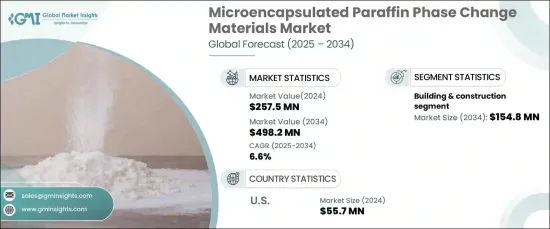
세계의 마이크로캡슐 파라핀 상변화물질 시장은 2024년에 2억 5,750만 달러에 달하며, 2025-2034년에 CAGR 6.6%로 확대할 것으로 예측됩니다.
마이크로인캡슐레이션 PCM은 열에너지를 효율적으로 저장하고 방출하는 능력이 있으며, 건축을 중심으로 다양한 분야에서 채택이 진행되고 있습니다. 이러한 재료는 폐열 회수, 실내 냉난방, 태양열 온수 시스템 등의 용도로 널리 사용되고 있습니다. 전 세계에서 건설 활동이 지속적으로 성장하고 있으며, 특히 선진국과 신흥 국가 시장 모두에서 대규모 프로젝트가 진행되고 있으며, PCM에 대한 수요는 크게 증가할 것으로 예상됩니다.

시장은 건축 및 건설, HVAC, 전자, 섬유, 섬유, 헬스케어, 항공우주, 자동차, 포장, 화학 등 최종사용자 산업별로 분류됩니다. 이 중 건축 및 건설 분야가 가장 큰 비중을 차지하고 있으며, 2024년에는 7,440만 달러의 매출을 올리고 2034년에는 1억 5,480만 달러로 성장할 것으로 예상됩니다. 건설 업계에서는 PCM을 건축자재에 통합하여 열 질량을 높이고 건물의 온도 조절과 에너지 효율을 향상시키고 있습니다. 마이크로인캡슐레이션 PCM을 구조물에 통합하는 주요 이점 중 하나는 여분의 열을 저장했다가 필요할 때 방출하는 능력입니다. 이 용도는 에너지 소비와 탄소발자국을 줄이는 데 큰 역할을 하므로 지속가능한 건축에 선호되는 선택이 될 수 있습니다.
| 시장 범위 | |
|---|---|
| 시작연도 | 2024년 |
| 예측연도 | 2025-2034년 |
| 시작 금액 | 2억 5,750만 달러 |
| 예상 금액 | 4억 9,820만 달러 |
| CAGR | 6.6% |
건축 외에도 PCM은 다양한 용도로 연구되고 있으며, HVAC 산업에서는 온도 변동을 조절하고 시스템 성능을 최적화하여 에너지 절약에 기여하고 있습니다. 포장 산업은 특히 온도에 민감한 배송에서 일정한 온도를 유지하는 것이 중요하므로 PCM 사용의 이점을 누릴 수 있습니다. 또한 헬스케어 산업에서는 의료기기 및 보호 장비의 온도 관리에 PCM을 사용하여 보관 및 운송 중 최적의 상태를 보장하는 사례가 증가하고 있습니다.
미국의 마이크로캡슐 파라핀 상변화물질 시장은 2024년 5,570만 달러에 달할 것으로 예상되며, 이는 에너지 효율적인 건물과 지속가능한 건설 관행에 대한 관심이 높아진 데 따른 것입니다. 에너지 절약 규제 및 LEED 인증과 같은 친환경 건축 기준은 건물의 단열성과 에너지 성능을 향상시키는 PCM 채택의 동기가 되고 있습니다. 또한 재생에너지 저장 솔루션과 첨단 HVAC 시스템에서 PCM의 사용이 증가하면서 시장 성장을 더욱 촉진하고 있습니다. 헬스케어 및 자동차 등의 산업에서 PCM의 역할이 확대되면서 PCM의 다용도한 용도가 강조되고 있으며, 이는 수요를 지속적으로 촉진할 것으로 예상됩니다.
The Global Microencapsulated Paraffin Phase Change Materials Market was valued at USD 257.5 million in 2024 and is projected to expand at a CAGR of 6.6% between 2025 and 2034. Microencapsulated PCMs are increasingly being adopted across various sectors, particularly in construction, due to their ability to efficiently store and release thermal energy. These materials are widely used in applications such as waste heat recovery, room heating and cooling, and solar water heating systems. As construction activities continue to grow globally, particularly with large-scale projects underway in both developed and emerging markets, the demand for PCMs is expected to rise significantly.

The market is segmented by end-user industries, including building and construction, HVAC, electronics, textiles, healthcare, aerospace, automotive, packaging, chemicals, and others. Among these, the building and construction sector holds the largest share, generating USD 74.4 million in revenue in 2024 and expected to grow to USD 154.8 million by 2034. In the construction industry, PCMs are integrated into building materials to enhance thermal mass, improving temperature regulation and energy efficiency in buildings. One of the key advantages of incorporating microencapsulated PCMs into structures is their ability to store excess heat and release it when needed, thus reducing the need for external heating and cooling systems. This application plays a significant role in reducing energy consumption and carbon footprints, making it a preferred choice for sustainable construction.
| Market Scope | |
|---|---|
| Start Year | 2024 |
| Forecast Year | 2025-2034 |
| Start Value | $257.5 Million |
| Forecast Value | $498.2 Million |
| CAGR | 6.6% |
In addition to construction, PCMs are being explored for a range of other applications. In the HVAC industry, they contribute to energy savings by regulating temperature fluctuations and optimizing system performance. The packaging industry is also benefiting from the use of PCMs, particularly in temperature-sensitive shipments, where maintaining a consistent temperature is crucial. Furthermore, the healthcare industry increasingly utilizes PCMs for thermal management in medical devices and protective equipment, ensuring optimal conditions during storage and transport.
U.S. microencapsulated paraffin phase change materials market was valued at USD 55.7 million in 2024 and is driven by the growing emphasis on energy-efficient buildings and sustainable construction practices. Energy-saving regulations and green building standards, such as LEED certification, motivate the adoption of PCMs to improve building insulation and energy performance. Additionally, the increasing use of PCMs in renewable energy storage solutions and advanced HVAC systems further supports their market growth. The expanding role of PCMs in industries such as healthcare and automotive is expected to continue driving demand, highlighting their versatile applications across multiple sectors.